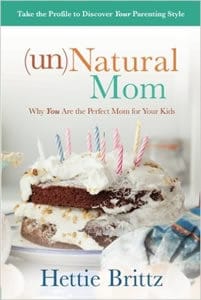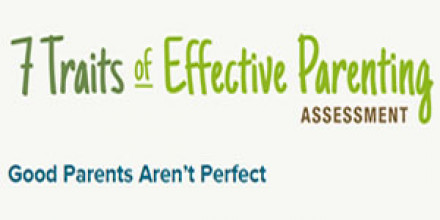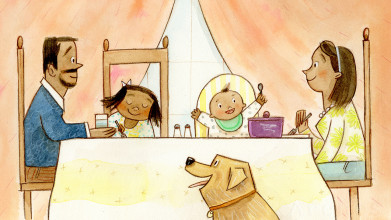Excerpt:
Hettie Brittz: When we understand that kids have a design and we have a design and our assignment was never to break this design, we are to prune it gently into a work of art. But God has put the basics in there. Once we accept that and we stop trying to change them, then the joy starts happening.
End of Excerpt
John Fuller: Well, she has three children and that’s Hettie Brittz reflecting about how God’s uniquely designs each of our kids with their own personality and it might be quite different from yours. Hettie is with us again on “Focus on the Family.” And your host is Focus President and author, Jim Daly. Thanks for listening; I’m John Fuller.
Jim Daly: John, we started a great conversation last time for moms. And if you’re in that spot, you’re the mom who feels stressed out, you don’t connect well with your kids, something’s different, you need to take this time—and I’m sure you don’t have it. I know Jean would say, “I’ve got so much to do.” But take this time and listen to our guest today, because I think she has some wonderful insights that will help you understand yourself temperamentally as well as your children.
John: And there are a lot of background details to our conversation today that are contained in the first day of our conversation with our guest, and that’s available as a download or a CD at http://focusonthefamily.com/radio.
Hettie Brittz is one of South Africa’s leading parenting experts, and she and her husband, Louis, have three children. And she’s the author of a number of books, including (un)Natural Mom.The subtitle is so informative, Jim. Why You Are The Perfect Mom For Your Kids.
Jim: I love that title. Hettie, welcome back to Focus.
Hettie: Thank you, Jim. Thank you, John.
Jim: For those that didn’t hear the program last time—I would encourage you, by the way, to get that download or however you can get it, CD from Focus—you talked about the different personality types that moms possess, and these are God-ordained things. I mean we are—it’s amazing we can generally fit into four, and there are other personality profiles that have done this—the DISC test and others. But you associated them with trees in order to capture the seasons of life. Let’s quickly describe each one for the listener, each mom listening, what am I? It doesn’t put you in a box, per se, and you probably have different attributes of each that you pull from, but let’s go through the four and then have some more discussion about it.
Hettie: Yes, I will start with the very quiet, contained mom. We call her the pine tree because of the calming effect the pine fragrance has on us. She brings peace, harmony, unity in the home. She doesn’t sweat the small stuff. She sticks to the big picture. She’s patient with her kids. Every now and again has a bit of a challenge with routine, and remembering all of the details and getting kids to school on time—the parts where the family needs to be driven. That’s what’s tough for this mom. And discipline is outside of her comfort zone because she wants to make everybody content, not–.
Jim: She’s the peacemaker.
Hettie: –yeah, she doesn’t want any crying going on in the house. So that is her challenge, maybe, the discipline part.
Jim: Is life a little slower for that type of mom? I mean she wants to slow things down.
Hettie: Yes. Absolutely.
Jim: That’s a nice attribute, actually.
Hettie: It’s graceful.
Jim: What are some of the struggles that a mom of that temperament type will have with these children?
Hettie: Well, she will often be given a feisty child by the Lord through His wisdom.
Jim: So He does this on purpose, I think.
Hettie: He does, because it’s sanctification for both of them, you know. It’s part of their journey. So she will find it very tough if a child sends an aggressive message, “I hate you. I don’t want you as a mom. You’re a freak.”
Jim: That’ll cut deeply.
Hettie: That’ll cut very, very deeply, because for everybody to be content with what she offers as a mom is key for her. So that is –she’s easy to hurt. She’s a bit like Mary, Jesus’ mom, who has the sword that will pierce her heart and who will have to stand by and not be able to say anything and see her child come to harm and not have the personality to get in there and fight.
Jim: That’s the pine tree mom.
Hettie: That’s the pine tree mom.
Jim: Move to the next one.
Hettie: The next one, let’s talk about the palm tree mom. I chose palm because it represents the holidays.
Jim: The oasis.
Hettie: Well said. I never thought of that. Exactly. The oasis, because this is the mom who provides the fun in the sun and the entertainment. This is the mom who has a child in her that will never grow up, who will keep playing with the kids, and she will want the kids to be with her over the vacation times and over the holidays because she’s a people person. And she may overlook a lot of things that she should have paid attention to, but by the grace of God, I don’t know why, these palm tree moms get away with it and their kids grow up well-adjusted, even though they didn’t have the table manners, didn’t clean their own rooms, probably had too much money and too much stuff, and probably got a “yes” more often than they should have from this mom. But she is this “yes” face of God to children, a face of grace.
Jim: What are some of those weaknesses? You touched a little bit on that, but the palm tree mom, with that troubled child or with that difficult child; I don’t know what the match would be. But what would that child, the difficult relationship for the palm tree mom look like?
Hettie: Well, the palm tree mom will over-accommodate a lot of what should be disciplined out of the child for the sake of a happy atmosphere in the home. She may act immaturely. She may allow her kids to act immaturely, forgetting that she is a grown up and she is supposed to raise them to adulthood, not to fun in the sun.
But then her greatest challenge will come from the really serious child, the child who doesn’t want to be cheered up, the child who sees the dark side.
Jim: The deep thinker.
Hettie: The deep thinker. The child who mulls everything. She wants you to build a bridge and move on and lighten up. So the serious child is her challenge. And the only way to connect with that serious child is to get into the black hole a little bit with that child and to say, “What happened to you today was awful.” But the instinct of the palm tree mom is to say that it wasn’t that bad. And where she can’t be the cheerleader for a child, she may feel like a failure.
Jim: Ok, so that’s the pine tree, and the palm tree. Now what’s the third?
Hettie: Now we are heading to the moms who are very task-oriented, and the moms who may find parenting tough because of the way it tends to disrupt your day; it tends to slow down what you had planned for the day. So let’s start with the rose bush mom. I have a lot of her in me, and so I can speak from experience that the rose bush mom’s greatest regret is often what we have said and done in haste, because we want to keep things moving all the time, moving forward and upward, so we have high standards. We have expectations of child beyond what they can do at a certain age. Because we lose connection with the child in us very early on. We grow up fast.
Jim: You’re mature for your age.
Hettie: Yes, we—well, I don’t know if I am, but yes.
Jim: That child. That 5-year-old is already thinking like an 8-year-old.
Hettie: Exactly. The rose bushes go after the milestones and they want to be there first. So this mom who doesn’t slow down often enough to really listen, to really connect, that’s where her regrets may be, as mine are. What’s wonderful about the rose bush mom is that she tends to motivate her kids to do their best, be their best at all times, because she’s not happy with anything less than everything you’ve got.
Jim: What are some of the friction points in that household if the mom is a rose bush mom? How are the kids reacting when it’s negative? And why?
Hettie: It’s about her pace, generally, so the kids who are more laid-back and who need some time getting warmed up—you can’t just grab them out of bed and put them in the car; they need to be warmed up before you can get them going—those kids become more and more stubborn. So it tends to become a standoff.
Jim: And how should she handle that moment in a better way for the outcome? This is the internal driver that she has. She’s ready to go; church is a half hour away; and we’re 45 minutes away to get there. And you do this every Sunday and [growling]. And the son is saying, “I know, Mom, but come on, it’s summertime, it’s wintertime, it’s whatever time.” How can she make that a more productive encounter?
Hettie: She needs to set the boundaries outside of the heat of the moment. So the night before she needs to say, “This is how tomorrow’s going to go down. If A happens, B is going to be the consequence.” And then she just needs to calmly announce what has just happened. But in the heat of the moment, this mom can be too aggressive, so she needs to stick to the script where she just says, “I said if you’re not on time I’m leaving without you, so that is what is happening now.” But if she didn’t agree on that last night, now that she’s upset and frustrated, she’s going to overreact.
Jim: Right, and sometimes apply those consequences in the moment when there has been no discussion about it, and then the child is going, “Where did this come from?”
Hettie: Exactly.
Jim: “You always take my allowance away at the last minute,” right?
Hettie: Exactly. It feels like spitefulness.
John: I’ve heard that very statement very recently in fact.
Hettie: There is great magic in discussing things outside of the heat of the moment—even afterward.
Jim: So the person and the child knows it.
Hettie: Yes.
Hettie: Even afterwards, because sometimes you are too angry to be rational.
Jim: You’re wanting to win the day.
Hettie: So you need to get in the car and arrive at the school later this afternoon at 3 o’clock. When you pick up the kids, you go, “I need to revisit 8 o’clock this morning. This is what happened and I thought about it and this is what’s going to happen now.” So this mom needs to pause, think, and then make a very rational, logical decision about a consequence.
Jim: And try not to execute justice in the moment.
Hettie: Absolutely.
Jim: Have it predetermined.
Hettie: We tend to see everything as a corporal-punishment scenario.
Jim: A great opportunity to train the child. Okay, we’ve got the pine tree, the palm tree, the rose bush, and now we’re moving to the boxwood. Describe her. And now we’re moving to the boxwood. Describe her.
Hettie: The boxwood tree I picked because this is the mom who can be pruned into any shape, just like a boxwood shrub can. You can make hedges out of them, you can make these beautiful decorative trees at your front doors.
Jim: Topiaries done with boxwood.
Hettie: Exactly. So you can do artwork with this mom. And this is the mom who wants to find the one right way to raise kids—the guaranteed way for excellent results in child rearing—and it doesn’t always work that way, so that can be a frustrating when you are a boxwood mom, because you read the book, you did what it said, and you didn’t get the results that they guaranteed.
Jim: So very formulaic in their thinking. A + B = C.
Hettie: Yes, and they love the star charts and the little tasks up on the wall. Everybody’s chores.
Jim: Home rules.
Hettie: Yes. Home rules and all of the structured little plans and projects that you can do. And there is something very beautiful about that, because they do create order. Their kids tend to be on time, they tend to have everything they need, everything is planned. There is great security for the kids in that, because they know Mom’s going to be there; everything’s going to be provided for; things are going to be ready. So this is a mom they can count on and there is wonderful value in that, because God is that way. He’s dependable. He’s faithful. He is predictable in the sense that He always keeps His word. And she models this to her kids in a beautiful way, but she’s not always having fun.
Jim: And just to remind everybody, if you don’t like that boxwood definition or the rose bush definition, this is generality. You take on attributes of everything, probably, but this is your general tendency. Is that a fair way to say it?
Hettie: Yes, and there is no reason to feel I’d rather be a pine or I’d rather be a palm because once we look at what they reflect about the heart of God, all of them get a place in the sun. Every personality has beautiful value because they are God-given and He didn’t discriminate against me when He made me a box/rose combination.
Jim: Right. In many ways it’s law and grace. I mean how do those two fit together. But in God’s view, they do.
Hettie: Yes.
Jim: They are not separate; they’re together.
Hettie: No. Love and justice.
John: And He’s made all of us unique and so you may not like your present circumstances and the way your personality is coming out in that, but the way you’re wired is a gift from God, and you’ll find encouragement in that in Hettie’s book, (un)Natural Mom. We’ve got that and a CD or download of this conversation at http://focusonthefamily.com/radio.
Jim: Hettie, we’ve talked a lot about the unnatural mom, it’s the title of your book, but these attributes play into your marital relationship as well, I’m sure. And the parenting role. I think for Jean and I the area that we will disagree on the most is parenting. And I can see it now as you’ve described it in your book (un)Natural Mom, I can see my unnatural dad-ness in there. So you can see where these different attributes can conflict for the marriage as well, where you’ve got to understand each other’s tendencies so you can tolerate and love each other the way the Lord wants you to. You had to learn that with your husband, Louis, and it was difficult, wasn’t it?
Hettie: Absolutely, because we are polar opposites. He is a pine/palm combination, so he is the festive committee, and I’m Hitler in the home. I’m the rose/boxwood combination, so I want order and I want it now.
Jim: And he wants a party.
Hettie: He wants just peace and happiness in the home. And the kids figure out the difference very quickly, and they play that field unless we come together in unity. And for us, unity didn’t mean I become you or you become me, because we understand spiritual growth to be growing into the image of Christ, and that is all of this reflected off of us in unique ways. But it does mean that we honestly look at this and say if the kids are going to ask if they can quickly go for a swim in the hotel pool, 90 percent chance Mom will say “no,” 90 percent chance Dad will say “yes,” because Dad will go, “There is a pool. There are kids. This is easy.” I’m going, “We don’t have swim towels. They’re going to use the white towels of the … the white towels of the hotel. There is going to be drippings all over the carpet. You know that’s what’s I’m thinking.
Jim: It’ll make it untidy.
Hettie: The boxwood mom spitting out all the reasons not to have fun. So we’ve had to decide that certain things he will have the last say on because he can be more rational there, and certain things I will have the last say. So we have had to divide and conquer a little bit when it comes to decision making in the home so that they will not be “Mom says A and Dad says B,” but that there will be one answer. Because I will say “no” when I shouldn’t and he will say “yes” when he shouldn’t, and when we can own up to that, we can say, “When it comes to dating, going out with friends, all of the social stuff, Mom will have the final say.” In our house, that’s how it was decided.
Jim: So you structure it.
Hettie: Yes.
Jim: Now how do you—that sounds very rational, very rose bush of you. Congratulations Miss Rose Bush. But how do you bite your tongue. How does your husband say, “Okay, I get that,” and then vice-versa when he’s got the last word? How do you actually train yourself to say, “Well, I agreed that he will have the last word here, so I’m not going to say anything”? But doesn’t it irritate under your little petals?
Hettie: It does. It did just yesterday when we arrived on the airport here in Denver and I had a certain plan on how to get the kids and the rental car and us and the luggage reunited after all sorts of stuff went wrong, and he had a different idea, and I feel like I am more practical and more structured, and his only concern was let’s not disrupt the kids too much, because he is the nurturing pine/palm combination. I’m thinking let’s just get this done. And it was an interesting play off there, because eventually I ended up being parked where I shouldn’t be parked, fencing off state troopers for the privilege of still waiting here, which the rose bush can do. But because of the boxwood in me, I was in tears by the time they arrived at the car with the luggage. I had put myself in a situation where I fought like a rose bush for this curbside parking spot, but couldn’t deal with it because of the boxwood that knows I just pushed a boundary and it’s not okay. And I was so overwhelmed by how long it took my husband and the kids to get all of the luggage to the car. I had a meltdown.
Jim: Probably about an hour.
Hettie: No, it was long, and then the pine/palm tells me, “I need you to check out of panic mode now.” And that—the only reason I could do that is because before we came on this trip he sat us all down and he said, “There are going to be traveling days that are not going to be fun. All of you are going to be stressed in different ways because of your personalities and all of your sensory issues, but we are going to have a saying that is, ‘I need you to build a bridge.’ And if I say that to you, then you are going to build a bridge. Because it’s a great privilege to be on this tour, but it’s not going to always be comfortable. Build a bridge.” So he essentially told me to build a bridge.
Jim: Hettie, the honest truth is I mean you and Louis have almost divorced. I mean you’ve thought of that in your heart, and that’s not uncommon. And it’s a serious thing when you think about that, because you thought you were so incompatible. How did you go from that kind of secret in your heart that I’m just not the right person for my husband? Because I think a lot of wives and a lot of moms feel like that in their marital relationship. I’m not the right person. Or I married the wrong person. How did you go from that to recovering and having a healthy marriage?
Hettie: I had to step down from that little pedestal where I thought to be like me is the right way to be, and I need to help him to be more like me, then everything’s going to go well. Because in a way all of us do that. All of us want people to be more like us, because that simplifies matters. But I had to listen to the Lord say to me, “You need to study who your husband is, because there is value in his design. There are things there that you need desperately; that’s why I gave him to you. He is part of your salvation, but you need to recognize that and respect that,” because I don’t think I always even respected him. And I, when I understood the great gifts that are in a pine/palm combination, and especially in the pine tree for me, he cools me down, he gives me the big picture, he sees the strategy for our family and he’s never made a mistake. He hears from the Lord because he sits and he listens, because he’s not constantly in a hurry. He thinks before he speaks. And that has been so valuable in our marriage and in parenting through the years. And very often now I am so grateful that I can tag him and say, “Honey, I need you to take over today. I need to stay back right now because I have lost perspective,” which a box/rose often does, but a pine tree seldom does.
Jim: That is good. Hettie, let me continue on that God front, because so often, and you’ve stated it clearly, it’s not about changing him or them, your husband or your kids. It’s about looking into your own heart and saying, “What is motivating me to want to control them and want to change them?” How does God work that out in your heart? How do you get to that place where you can relax and you can rest in the shade of the pine tree as a rose bush? I’m looking for those practical helps, because women are connecting with you right now and they are saying, “I am that person. I am driven. I am the rose bush. I am the boxwood.” Did I get that right? Boxwood? I am the boxwood. “Give me that sense that God can still use me and work through me, because I’m feeling kind of chopped up right now. You’re turning me into some firewood here.”
Hettie: Chopped up is the best place to begin, because that is what God tends to do. He tends to put us in conflicting relationships. We come to the end of ourselves. All of our tricks fail. Our child is not like us anymore. Our husband threatens divorce. Our relationships fall apart. And suddenly I realize I’m not enough in just who I am. I’m not the ultimate person. I am not the experiment and everybody else is the control group. It’s not like that. I need people who are not like me. So it starts from a broken place; only then can I start seeing there is value in somebody else.
For me, the turning point came when I made the biggest mistakes in my life—in parenting, in our marriage, in work—wherever it is. So it’s not a bad place if you’re listening today and you’re saying, “I’ve messed it up.” It’s a great place to be, because right now your eyes are open, your heart is open, and you can say to the Lord, “Show me the value of the people in my life. Show me the value of my child, my husband, my support system.” And then I can hook in with all of these people and raise the kids together. Because our assignment was never to be all our children will ever need. Our assignment was to point them to Christ. And that all of us can do, no matter what kind of a tree or combination we are.
Jim: I mean that is well said. Is there anywhere in Scripture that we can see how God worked through moms—moms specifically, moms in the Bible—to see how they were the exact moms that their children needed? Is there an example?
Hettie: Yes, I think the example of Moses is a really good example. Here is a mom who didn’t care about the law. The law was you can’t have kids. We are going to kill them all. You have to give up your babies. And she just said, “There is no way.” This is probably a rose bush mom, feisty mom who said, “No, I’m going to fight for this baby.” And it says so beautifully in the Bible, “She saw that he was beautiful.” And she hid him, she put him in the Nile—we know the story—and even then she didn’t accept the fact of her son. Even then, she went after him until she could nurse him and she could feed him, even though he was raised in Pharaoh’s palace.
And Hannah was the same. Here is a mom pleading a son from the Lord, only to give him back. I can just imagine her friends saying, “What is wrong with you? You waited so long to have a baby. Now you are returning him to the temple? Did you not like this particular baby? What’s wrong with you?” But there are moms who definitely have been able to work with weird stories. It’s not the normal nuclear family. It’s not the happy ending. It’s not the dream story. But look at the purposes Moses and the prophet Samuel fulfilled in their lifetime because of unnatural moms who did unnatural things with great courage—and undoubtedly with resistance and people shaking their heads at them.
Jim: I like the idea that biblical stories, if we really look at them, they are messy.
Hettie: Very.
Jim: They’re not Leave it to Beaver. I mean it’s crazy. It’s, you know, just wild things. A lot of treachery, a lot of twists, a lot of human personality manipulating or trying to manipulate the outcome, and God comes along and says, “No. I got this. I’m in control and here’s how it’s going to work.”
It has been such a treat to talk with you, Hettie, about your book, (un)Natural Mom. So many good things in here for us to know, both as dads and moms and husbands and wives. Just terrific content. Thank you for being with us. Can I turn to you? If you are struggling, you’re hearing this going, “Man, she has nailed me!” We want you to call. You don’t have to live in that marriage that is struggling because the two of you simply can’t get along or you’re not the mom you need to be and you have a very difficult relationship with one or maybe all of your kids. There are ways to have a brighter day. God has given us all the answer, and I think Hettie is opening the gateway for us to know God’s heart better and for us to love each other in a way that He wants us to love each other. And I would encourage you to contact Focus to get that help today.
John: Our number is 1-800, A-FAMILY; 1-800-232-6459. We also have lots of resources, including the book by Hettie and other helps at http://focusonthefamily.com/radio.
Jim: Hettie, you live in South Africa and you speak for Focus South Africa a couple of weeks out of the year, and we are blessed to have you. Many people don’t know the international work of Focus. Many people don’t know we have far more radio listenership outside of the US, John, than in the US, and the US is about 5 1/2 million a week. But outside the US we have over 100 million people listening to the radio program, including many countries there in Africa. Talk about the impact. Family is universal, isn’t it?
Hettie: Absolutely. And the struggles are too. But the solutions in Christ crosses over all the boundaries and all the cultures.
Jim: Isn’t that something that we can relate at that level? Husbands–
Hettie: I grew up on that.
Jim: Yeah, husbands—you said that. Focus meant a lot to you when you were a little girl. What did you connect with?
Hettie: A young mom. The hopefulness. I loved the hope that was always in the broadcast. I never—I can’t remember a single time I listened to the radio and thought, “Well, I couldn’t do that,” or “Well, that won’t work for me.” There was always that hopefulness, the practicality, the accessibility of the truth.
Jim: Well, we appreciate your partnership. And if you can participate with us to bring that hope—the hope of Christ, really, that’s what it is—partner with us. Be there with us. Let’s help change not only marriages and parents in this country, but literally around the world. I think we air in over 130 countries, and your giving can spread far and wide to help families everywhere. And I hope you will partner with us today. Hettie, thank you so much for being with us and … for being with us, and thank you for your book, (un)Natural Mom. I can see the natural mom in you.
Hettie: Thank you, Jim, that’s beautiful. I appreciate that. And thank you, John.
John: Well, it’s been a privilege. And we’ll encourage you to call us and find out more about how you can donate and be a part of the worldwide work of Focus on the Family and when you do, ask for a copy of (un)Natural Mom. In fact, today, make a generous donation of any amount and we’ll send that book to you as our way of saying thank you for your partnership. also in addition to that your gift will be doubled thanks to some kind friends to this ministry. So please, make a difference by donating today. Our number is 800, the letter A and the word FAMILY; 800-232-6459. Or donate and find resources at www.Focusonthefamily.com/radio.
On behalf of Jim Daly and the entire team, thanks for listening. I’m John Fuller inviting you back next time as we hear a touching story about loving and appreciating your spouse, ‘Til Death Do You Part, as we once again help you and your family thrive.




















